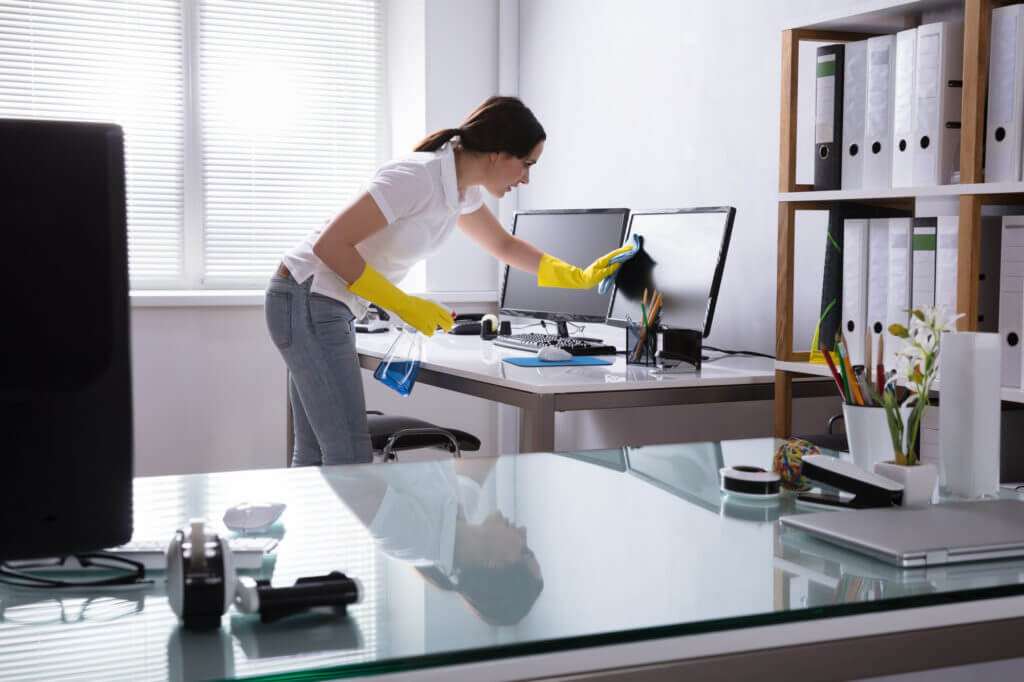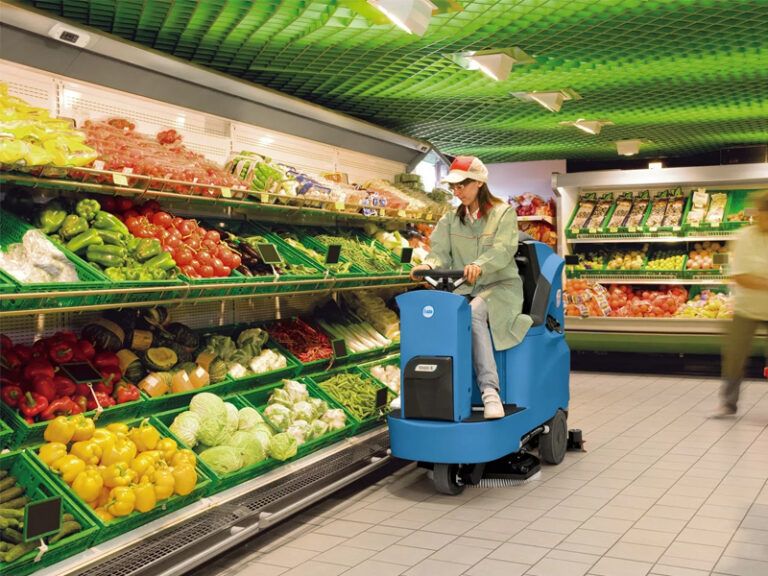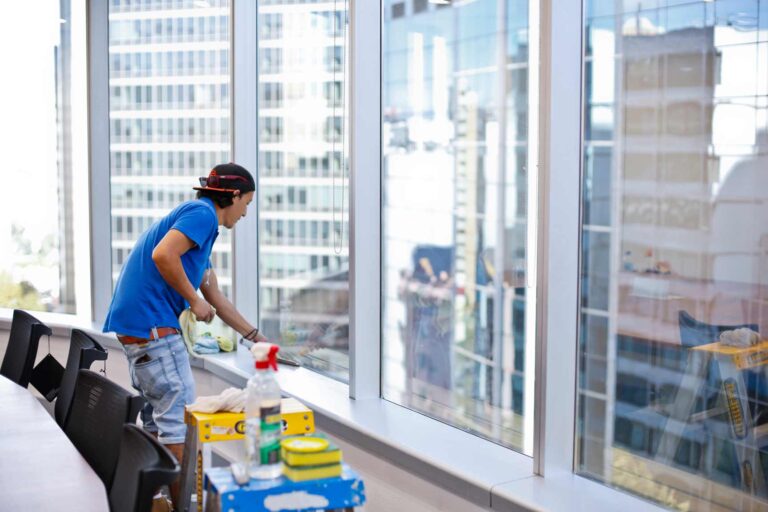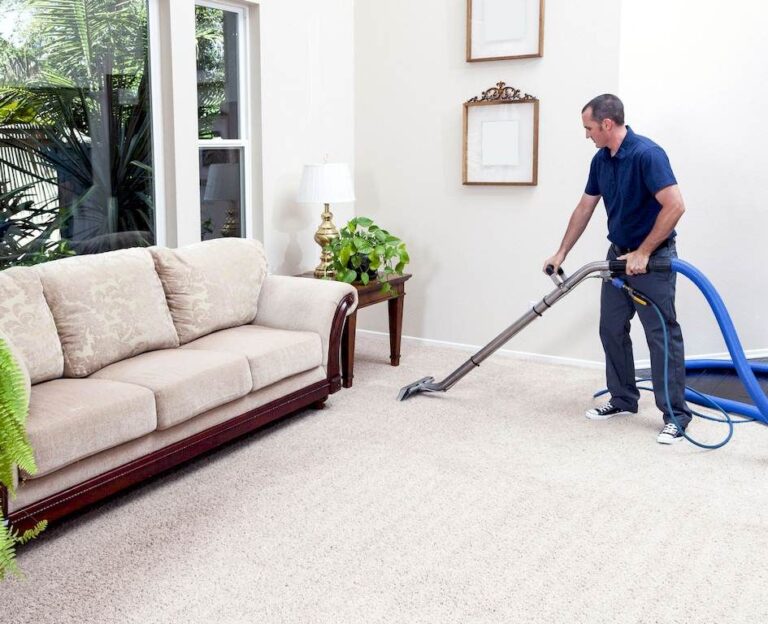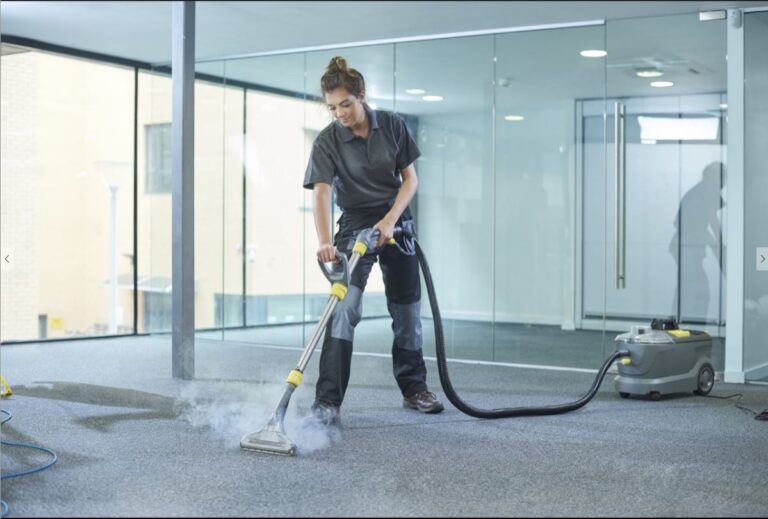We all fear the flu season, the aches and strains, coughing, and several other dreadful symptoms that can last for days. Often, having the flu is just an inevitable fate, particularly for those working in offices.
During the winter season, respiratory diseases tend to increase, especially influenza. Since places are often poorly ventilated due to the cold, creating environments conducive to the spread of infectious diseases.
Work environments are not exempt from this problem, quite the opposite. People spend much of their day in closed offices and workplaces, never like before in history, spaces with little ventilation and direct contact with other people. This situation increases the risk of contagion of respiratory diseases.
Every year, billions of people suffer from cold, and every flu season brings various infections and allergies along with it. So, how can organizations protect their employees and disinfect the workplace during the flu season?
Strategies to defend against flu in the workplace.
Practice good hygiene at work.
Remember that the greatest protection against common diseases like the cold and flu is prevention. Good hygiene is, therefore, essential in the context of optimal contagion prevention. Here are some acts you can perform during cold and flu season:
- Washing your hands habitually with soap and hot water
- Cover your face with your forearm whenever you sneeze or cough
- Avoiding putting your hands near or on your face
- Wash your hands before snacks or meals
- Throw a tissue after each use
- Wash your workspace regularly (desk, keyboard, mouse, etc.)
- Skip work if you have any indications of flu or cold (fever, sore throat, cough, difficulty breathing, vomiting, headache, ear pain), even if they are minor.
Wash your hands frequently.
Frequent hand washing is a well-established practice in some areas, such as the restaurant business. However, it applies to all workplaces.
Appropriate hand washing is one of the most helpful and useful ways to prevent the spread of colds and flu. It is especially important to wash your hands after using the toilet and before eating. Wash your hands meticulously with warm water and soap for at least 30 seconds.
Use an alcohol-based disinfectant.
Alcohol-based hand sanitizer is the most effective quick sanitizer at killing germs and viruses. However, hand sanitizer is not a substitute for washing hands with soap and water. It can come in handy when a sink is not at hand, and you have just coughed into it.
Keep a disinfectant sanitizer at your desk, or ask your company to provide disinfectant dispensers in hallways or common rooms (meeting room, dining room, cafeteria, etc.).
Regularly clean the contact surfaces.
Your employer must keep the spaces in your workplace clean by cleaning them with antibacterial products to limit the spread of germs and viruses. Organizations must ensure to clean areas such as dining room counters, doorknobs, coffee machines, and bathrooms (which many people touch on a daily basis).
It would help if you also clean your workspace (your desk, keyboard, phone, etc.) with an antibacterial cleaner.
Avoid shaking hands and kissing on the cheeks.
These formalities are well-known in the business world. Shaking hands and kissing on the cheek are common courteous gestures when meeting up with a colleague after a long trip or seeing a long-time business partner, for example.
However, during the cold and flu season, these formalities can become a major driver of the spread. They increase the risk of catching the flu or a cold. It is, therefore, important to avoid such courtesies as much as possible.
If circumstances require you to adhere to a certain etiquette, be sure to wash your hands before moving on to another activity.
Get vaccinated.
A yearly seasonal flu shot (either the flu shot or the nasal spray flu shot) is the best way to lower your chances of getting the flu and spreading it to others.
Be careful with sharing food in common areas.
Contagious diseases are often contracted in common places, such as the dining room and the meeting room. Today, several employers make snacks available to employees: a bowl of fruit in the dining room or muffins in the meeting room.
During the cold and flu season, make sure that hygiene rules are in place for this purpose. It is a good idea not to have bowls that everyone can dip into with their hands. Instead, invite your employer to serve individually wrapped portions.
Stay home when you are sick.
Coming to work when you’re sick is a common dilemma in the workplace. Since colds and flu are highly contagious diseases, this practice puts all of your colleagues at risk of contracting them. It is in your best interest and that of your co-workers to stay home until you feel better.
Investigate your employer’s expectations for sick employees.
Beforehand, make sure you know what is expected of you if you feel sick. Do you have to notify your supervisor before a certain time of the day? Is an email notification acceptable and viewed? If your employer offers you paid sick leave, use it!
Avoid giving way to pride by showing up sick at work. Sick leave precisely allows you to stay at home until you feel ready for work again. Ask your superior if it is possible to take telecommuting days. You may be able to accomplish some tasks remotely, even if you don’t feel well enough to get to work.
Limit unnecessary travel for work.
Public spaces, specifically buses, airplanes, airports, and other public transport means, are real incubators for cold and flu germs and viruses. Limit as much as possible the opportunities to visit these common places during the season of these contagious diseases.
Stay informed.
Make sure you have the familiarity and tools to shield yourself during the cold and flu season. Ask your employer if documents providing information on good health and safety practices in your workplace are available. Also, make sure you understand your workplace sick leave policies to know ahead of time what to do if you experience symptoms of illness.
How do you recognize if you have flu?
If you feel unwell, you should call or visit your doctor, but you can also research common symptoms online.
People often do not distinguish the flu from the common cold, but they are very different. The flu is a respiratory infection that numerous people often mistake for a cold. The biggest difference between a cold and the flu is usually the presence of a sudden fever. Individuals with the flu oftentimes experience some or all of these symptoms:
- Fever or chills (although not all people with the flu have a fever).
- Cough.
- Sore throat.
- Runny or stuffy nose.
- Muscle or body aches headaches.
- Fatigue.
Many times people underestimate how sick they are and don’t think about how their decision to go to work can potentially infect other people.
Flu testing can help keep sick employees to stay out of the office. If an employee/worker knows that she or he is infected, they may be more likely to stay home as they do not want to infect their co-workers.
Potentially infecting your co-workers isn’t the only danger in going to work sick. You’re distracted at work if you’re not feeling well. It could lead to a series of dangerous situations if you work with machines or with your hands mainly (think bus drivers and chefs).
In a traditional office environment, slips and falls are among the most common security incidents, and if you are weak from the flu, you are certainly at greater risk of taking the wrong step.
Employees almost always feel that their responsibility and obligation are so important that they do not have access to even a well-deserved and necessary break. However, organizations must encourage employees to take care of themselves when necessary in order to ensure that they continually function their best.
Areas that need to be clean and disinfected.
Making sure your office is clean, safe, and healthy is important at all times.
Professional commercial cleaning staff can properly clean and disinfect your workplace, but they must be able to work in an open environment to produce the best possible sanitary results. It means that desks and workspaces should be clear of papers and objects before cleaning so that all areas are accessible to allow full professional sanitation.
- The frequently handled objects and surfaces in your office on which cleaning and disinfection should be concentrated are the ones that employees and visitors touch and handle most often. Therefore, the ones that collect the most germs and pathogens.
- All areas of very common use, such as desks, workstations, and chairs, must be disinfected properly to prevent the spread of contagious diseases such as cold and flu.
- Disinfect surfaces and objects of common use with the highest concentration of viruses: doorknobs, telephones, armrests, office supplies, keyboard, and computer mouse. It is important to disinfect them daily since many times we touch those objects, and then we put our hands to our eyes or mouth.
- Do not support bags, briefcases, or backpacks on the desk as they could carry viruses and thus spread them within the workplace.
- Do not smoke indoors. Tobacco smoke disturbs the body’s natural defenses, making it susceptible to potential respiratory infections.
- Ensure that your workplace complies with proper cleaning and disinfection practices such as keeping all work areas ventilated and complying with hygiene and disinfection routines of places and surfaces of common use, office elements, bathrooms, and kitchen.
Cleaning and sanitizing routines.
There are multiple products to adopt a correct cleaning and disinfection routine, but first, clarify that both terms have a different meaning.
Cleaning is removing visible dirt while disinfecting consists of eliminating viruses and bacteria present in the environment and on surfaces that we cannot see with the naked eye. So, you only get a thorough clean when you clean and disinfect.
Thus, it is necessary to use a product that contains an active disinfectant that eliminates 99.9% of viruses and bacteria. Liquid bleach is a product that is traditionally used to clean and disinfect.
Winter can put the immune system to the test, but taking adequate personal hygiene measures and committing ourselves to intensify cleaning and disinfection routines in the workplace can cut contagion and avoid transferring diseases to the home and families. In this way, we will be taking care of each other and multiplying the chain of protection. Because each person becomes a link in the chain, and in this way, the community as a whole is strengthened and stronger than ever.
To know more, click here.

